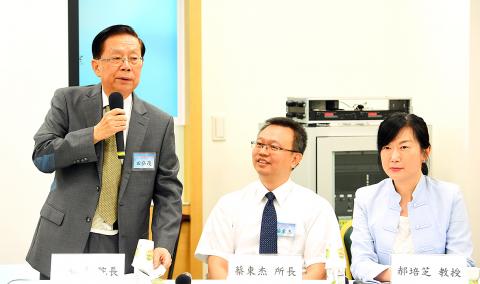The inclusion of Taiwan in China’s pending National Security Law means that China sees Taiwan as a major national security concern rather than as an internal affair or an issue of nationalism, suggesting that the issue is not up for compromise, academics told a forum hosted by the Institute for National Policy Research in Taipei yesterday.
After Chinese President Xi Jinping (習近平) last year expounded his outlook on Chinese national security, aiming to achieve the objectives in “eight dimensions and four stages,” China’s National People’s Congress began revising China’s National Security Law.
Article 11 of the law reportedly stipulates that protection of China’s sovereignty and territorial integrity is an obligation for all Chinese people, including the people of Hong Kong, Macau and Taiwan, and that no division is to be tolerated.

Photo: Lo Pei-der, Taipei Times
China has listed resolution of “the Taiwan issue” as one of its objectives in the proposed “third stage,” from 2021 to 2049, saying: “Appropriate measures must be taken to realize national unification and territorial integrity,” while including Taiwan in the law as part of its efforts toward achieving the goal, academics said.
For China, the nature of “the Taiwan issue” has changed from one sensitive to Chinese nationalism in the past to one that creates uncertainty about Chinese national security, because a separation of Taiwan divides Chinese sovereignty and territory and obstructs its plan to expand its maritime presence, National Taipei University professor Hao Pei-chih (郝培芝) said.
In view of the concerns, China is working on three fronts to resolve the issue, one of which is to “institutionalize” its claim that Taiwan is part of China by having Taiwan included in the National Security Law, launching the M503 commercial flight route and re-emphasizing its “Anti-Secession” Law, Hao said.
Meanwhile, China has continued to strengthen its armed forces while pushing for a military security coordination mechanism across the Taiwan Strait to counter the security alignment between the US and Japan, and to “decouple Taiwan from the alliance,” she said.
Tsai Yu-tai (蔡育岱), director of the Institute of Strategy and International Affairs at National Chung Cheng University, said the most salient element of Xi’s Taiwan policy is that he has produced what Tsai described as “a workable timetable” to resolve “the Taiwan issue.”
The characterization of Taiwan as an issue of national security concern to China marks a turning point in cross-strait relations, because it means that China considers its resolution imperative in response to changes in the international strategic environment, Tsai said.
That Taiwan is viewed as a national security concern paves the way for China to take military action against the nation.
It remains uncertain whether China would exercise its leverage over Taiwan through economic sanctions or launch attacks to resolve the issue, Tsai said.
“However, ‘securitization’ of the Taiwan issue has placed Taiwan in an even more difficult international environment because there will be no compromise with national security,” Tsai said.

The manufacture of the remaining 28 M1A2T Abrams tanks Taiwan purchased from the US has recently been completed, and they are expected to be delivered within the next one to two months, a source said yesterday. The Ministry of National Defense is arranging cargo ships to transport the tanks to Taiwan as soon as possible, said the source, who is familiar with the matter. The estimated arrival time ranges from late this month to early next month, the source said. The 28 Abrams tanks make up the third and final batch of a total of 108 tanks, valued at about NT$40.5 billion

A group from the Taiwanese Designers in Australia association yesterday represented Taiwan at the Midsumma Pride March in Melbourne. The march, held in the St. Kilda suburb, is the city’s largest LGBTQIA+ parade and the flagship event of the annual Midsumma Festival. It attracted more than 45,000 spectators who supported the 400 groups and 10,000 marchers that participated this year, the association said. Taiwanese Designers said they organized a team to march for Taiwan this year, joining politicians, government agencies, professionals and community organizations in showing support for LGBTQIA+ people and diverse communities. As the first country in Asia to legalize same-sex

Travel agencies in Taiwan are working to secure alternative flights for travelers bound for New Zealand for the Lunar New Year holiday, as Air New Zealand workers are set to strike next week. The airline said that it has confirmed that the planned industrial action by its international wide-body cabin crew would go ahead on Thursday and Friday next week. While the Auckland-based carrier pledged to take reasonable measures to mitigate the impact of the workers’ strike, an Air New Zealand flight arriving at Taipei from Auckland on Thursday and another flight departing from Taipei for Auckland on Saturday would have to

MOTIVES QUESTIONED The PLA considers Xi’s policies toward Taiwan to be driven by personal considerations rather than military assessment, the Epoch Times reports Chinese President Xi Jinping’s (習近平) latest purge of the Chinese People’s Liberation Army (PLA) leadership might have been prompted by the military’s opposition to plans of invading Taiwan, the Epoch Times said. The Chinese military opposes waging war against Taiwan by a large consensus, putting it at odds with Xi’s vision, the Falun Gong-affiliated daily said in a report on Thursday, citing anonymous sources with insight into the PLA’s inner workings. The opposition is not the opinion of a few generals, but a widely shared view among the PLA cadre, the Epoch Times cited them as saying. “Chinese forces know full well that